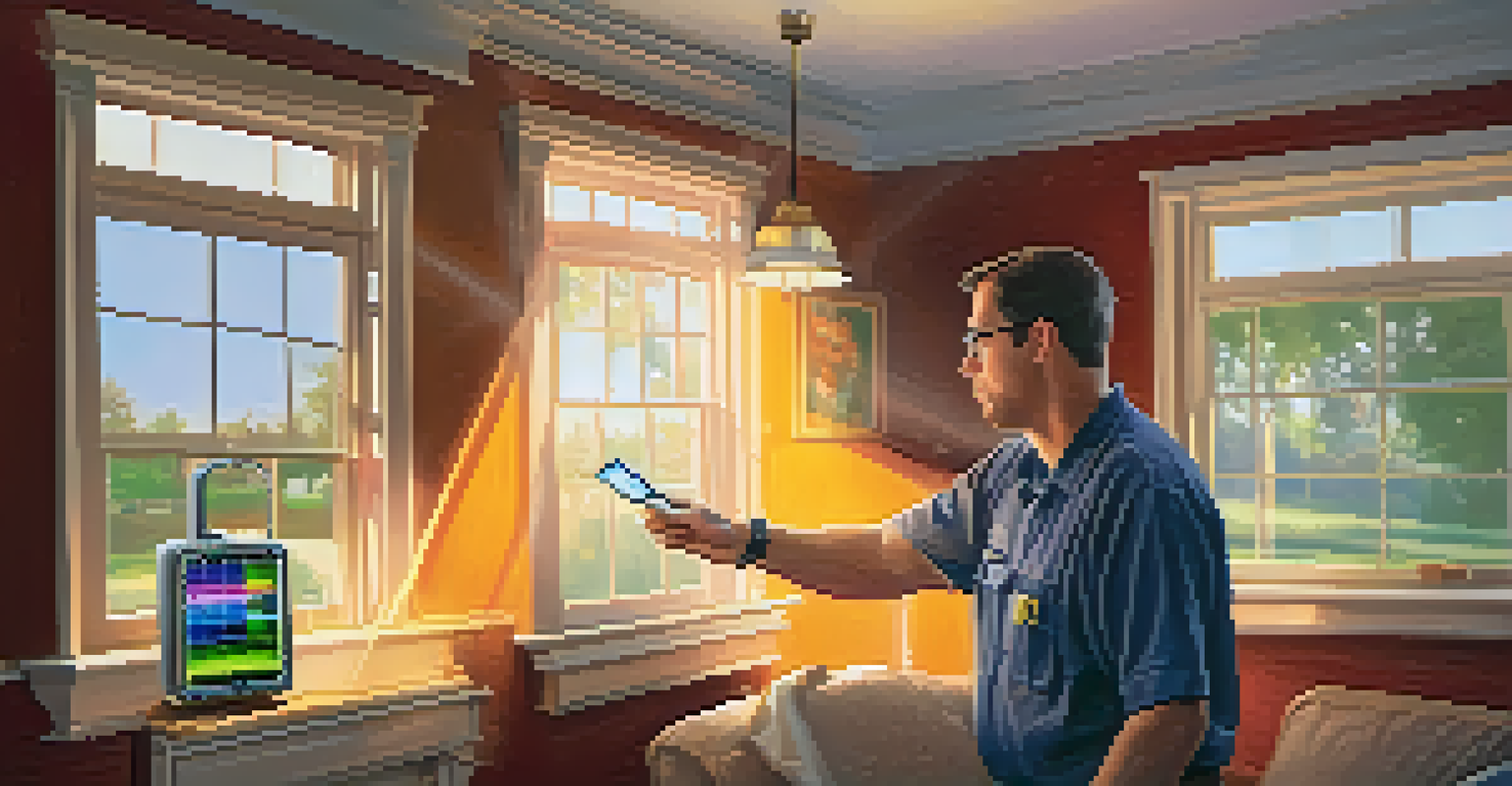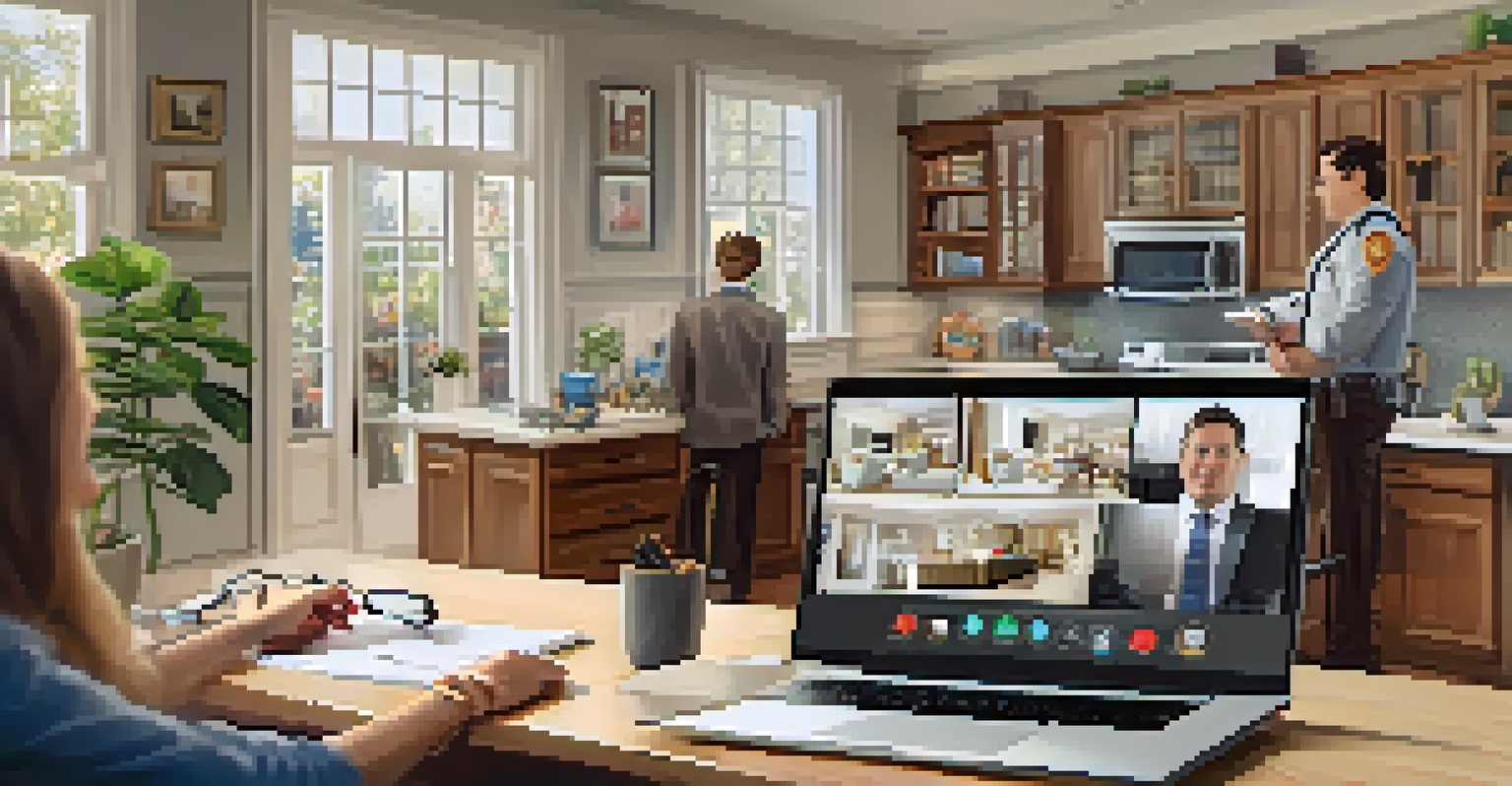Home Inspection Trends: What’s Changing in the Industry

The Rise of Technology in Home Inspections
Technology is transforming the home inspection industry, making processes faster and more efficient. From drones to thermal imaging, inspectors can now gather data that was once difficult to obtain. For instance, drones can easily capture roof conditions without the need for ladders, ensuring safety and accuracy.
Technology is best when it brings people together.
Moreover, software solutions are streamlining reporting processes, allowing inspectors to generate detailed reports on the spot. This not only saves time but also provides clients with immediate insights, enhancing their experience. The integration of mobile apps further allows clients to track inspection progress in real-time.
As technology continues to evolve, it's crucial for inspectors to stay updated on the latest tools. Embracing these innovations not only improves service quality but also keeps inspectors competitive in a rapidly changing market.
Increased Focus on Energy Efficiency
Homebuyers today are more conscious of energy efficiency than ever before. As energy costs rise, potential homeowners are looking for properties that can help reduce their monthly expenses. Home inspections are now incorporating energy audits to assess a home's insulation, windows, and HVAC systems.

This trend is driving inspectors to become more knowledgeable about energy-efficient practices and technologies. For example, inspections may include checks on solar panel installations or energy-efficient appliances, providing clients with a comprehensive overview of potential savings.
Tech Enhances Home Inspections
The integration of advanced technologies like drones and thermal imaging is revolutionizing home inspections, making them safer and more efficient.
As energy efficiency becomes a key selling point in real estate, inspectors who can offer this additional service will stand out. By highlighting energy-efficient features, they not only add value to their reports but also cater to the growing eco-conscious market.
Emphasis on Health and Safety Inspections
In light of recent global events, health and safety have taken center stage in home inspections. Buyers are increasingly concerned about indoor air quality, mold, and other environmental hazards. Inspectors are now expected to evaluate these factors thoroughly during their assessments.
The greatest danger in times of turbulence is not the turbulence; it is to act with yesterday's logic.
This shift has prompted many inspectors to undergo additional training to identify potential health risks within a home. For example, they may use specialized tools to detect mold or radon levels, ensuring that buyers are fully informed about any hidden dangers.
As awareness about health issues continues to grow, providing comprehensive health and safety inspections can be a unique selling proposition. Inspectors who prioritize these aspects enhance their credibility and reassure clients about their well-being in their new homes.
The Growing Importance of Continuing Education
Continuing education has become vital in the home inspection industry as standards and regulations evolve. Inspectors are encouraged to pursue ongoing training to stay abreast of the latest methods, technologies, and local building codes. This commitment to education not only sharpens their skills but also boosts their professional reputation.
Many industry associations offer certification programs and workshops that focus on new trends and best practices. By participating in these programs, inspectors can differentiate themselves in a competitive market and reassure clients of their expertise.
Focus on Energy Efficiency Grows
As homebuyers prioritize energy savings, inspectors are now including energy audits in their assessments to provide valuable insights.
Furthermore, an inspector who demonstrates a commitment to learning is often viewed as more trustworthy. This can lead to increased referrals and repeat business, as clients appreciate working with knowledgeable professionals.
The Shift Toward Virtual Inspections
Virtual inspections have gained traction as a convenient alternative to traditional methods. With the rise of remote work and digital communication, many buyers prefer to conduct initial inspections virtually. This allows them to assess properties without geographical constraints and saves time.
Inspectors are leveraging video conferencing tools to walk clients through properties and discuss findings in real-time. This approach not only enhances transparency but also builds trust between inspectors and their clients, who appreciate the ability to ask questions on the spot.
As this trend continues, inspectors must adapt their skills to effectively conduct virtual inspections. By embracing technology and offering flexible options, they can cater to a broader audience and meet the changing needs of homebuyers.
Client-Centric Approach in Home Inspections
Today's home inspectors are adopting a more client-centric approach, focusing on personalized services that cater to individual needs. Understanding that each client has unique concerns allows inspectors to tailor their inspections accordingly. This could mean spending extra time addressing specific problems or providing additional resources.
Building strong relationships with clients is now a priority for many inspectors, as referrals and repeat business are often rooted in positive experiences. By maintaining open lines of communication, inspectors can ensure that clients feel heard and valued throughout the inspection process.
Health and Safety Inspections Matter
Inspectors are increasingly evaluating indoor air quality and environmental hazards, addressing buyer concerns about health risks in homes.
Furthermore, offering post-inspection support, such as guidance on repairs or maintenance tips, enhances the overall client experience. This focus on customer service not only differentiates inspectors from competitors but also fosters long-term trust and loyalty.
The Impact of Market Trends on Home Inspections
The real estate market is constantly evolving, and these changes directly impact home inspection practices. For instance, as housing prices rise, buyers are becoming more discerning, requiring thorough inspections to justify their investments. In response, inspectors are raising their standards and expanding the scope of their services.
Additionally, the trend of house flipping has led to an increase in demand for detailed inspections. Flippers need to identify potential issues before purchasing properties, which in turn creates opportunities for inspectors to provide specialized services designed for this market segment.

By staying attuned to market trends, inspectors can adapt their offerings and better serve their clients. This proactive approach not only positions inspectors as industry experts but also equips them with the tools to navigate an ever-changing landscape.